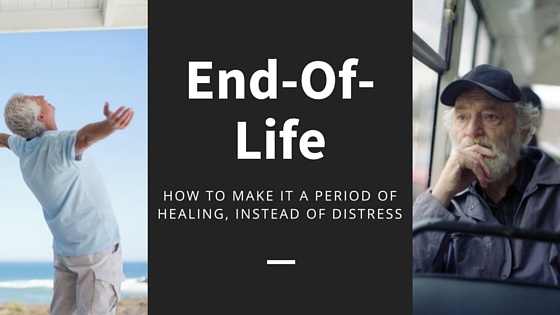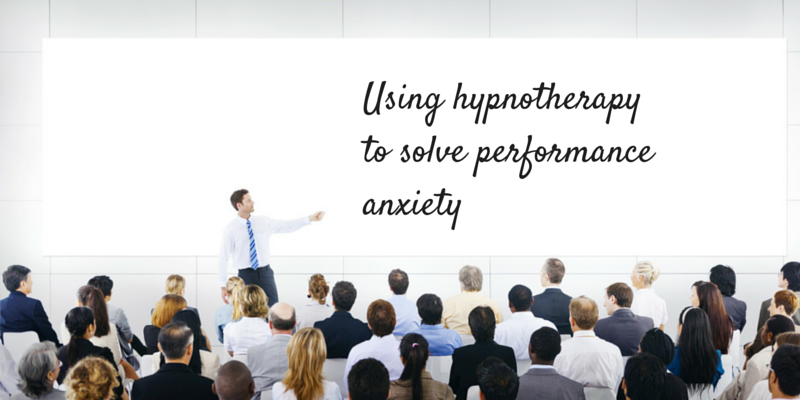How to Fill End-of-Life Preparation with Healing, Not Distress
How to Fill End-of-Life Preparation with Healing, Not Distress

“We don't deal well with death and dying in this culture," says Roland Griffiths, PhD, a professor of behavioral biology and neuroscience at the Johns Hopkins University School of Medicine. Being diagnosed with a potentially fatal disease often leads to a kind of chronic syndrome of anxiety, depression and emotional distress.
Those final days/weeks/months can be fraught with these negative emotions. Problematically, this period of time can turn into a spiral. But what if it could be used as a remarkable time for healing? The good news is that hypnotherapy can help with this.
Some of the issues to be addressed are (1) completing unfinished business with family, friends and co-workers; (2) asking for forgiveness and self-forgiveness for any perceived wrong-doings; (3) releasing pent-up emotions that may be locked in the body; (4) releasing attachments that may be preventing them from letting go of life on earth; (6) reconnecting disowned parts of themselves including their soul; and (7) developing or maintaining a strong spiritual connection.
Let's take each one of these issues by itself to examine it further to see why Heart-Centered Hypnotherapy is such an effective tool.
Completing Unfinished Business
Most people have not been given the tools during their lifetimes to communicate directly with friends and family members. In the trance state, their inhibitions and defenses are lowered so that they can speak their truth to their loved ones, and their “not-so-loved ones.” Within the privacy of their session, they can fully express all that they feel without worrying that they will hurt anyone’s feelings. Through this work they can also get clear if there is actually anything that needs to be said in person to complete this relationship. Often releasing the feelings is all that is needed; speaking them directly to the person involved is not necessary. This is most important since it is often this unfinished business that keeps people emotionally “hanging on” to life when their body is in extreme pain and is ready to go.
Asking for Forgiveness
Many people carry hidden guilt around with them for their perceived wrong doings during their lifetime. When they are facing death, this guilt can result in self-punishment and prolonged and unnecessary suffering. This is a personal issue as well as a spiritual issue. They need to ask whomever it is that they have wronged to forgive them as well as to ask God. This work needs to be done on the subconscious level since that is where all the self-blame is stored. And then it is important, of course, to have a deep conversation with themselves to release the guilt.
Releasing Pent-up Emotions
When people repress emotions in their bodies, these emotions block and drain their vital supply of energy. This energy is so important especially when they are often drugged for pain control. Also as they release the emotions, they become much more clear about what they may need to communicate in person. Emotions such as deep grief, anger, and resentment keep them locked in their bodies, unable to “let go”.
Releasing Attachments
Hospitals, nursing homes and hospice homes are filled with people who are ready to die but who can not “let go”. Attachments to people with whom they have unfinished business keep them hanging on for months and years. This causes the agony of unnecessary suffering on the part of the caregivers as well as the dying person. All attachments need to be released so that the individual is finally freed from any “hooks” that are keeping them in their suffering bodies.
Integrating Disowned Parts of Self (Soul Retrieval)
Often during the lifetime of an individual there have been certain traumas such as abuse, accidents, natural disasters, or major illness. During those times, a commonly used method of self-protection is repression, dissociation or disconnection from self. When a part has dissociated or split off from the whole, people sometimes describe it as “I feel empty inside” or “Ever since that time, I just don’t feel like myself.” Another common experience is described by the familiar song, “I Left My Heart in San Francisco.”
As part of the dying experience, it is important for individuals to go back and reclaim disowned parts of themselves. Whatever their experience, such as the loss of their heart, their soul, or a specific part of themselves, the hypnotherapist is in an excellent position to help the client reclaim these disowned parts. It is very common, once the person has access to their subconscious mind to be able to go back to where the part split off and to reclaim it. This integration process often is a powerful spiritual and emotional healing for the person
Developing or Maintaining Spiritual Connections
This is by far the most important work for the dying patient to address. And because Heart-Centered Hypnotherapy naturally guides them onto the spiritual plane, it is obviously a powerful tool to use. Some people are already very clear about the spiritual connection and so the trance work can be used to further deepen that connection.
Another group of people know they have some spiritual connection, but perhaps they have not really had the motivation to clarify it previously. Obviously this is the time to get into full spiritual contact and to address the spiritual issues such as forgiveness and where do I go from here? The Heart-Centered Hypnotherapy will assist them in discovering through visualization and directly experiencing who or what their spiritual connection is. They may see or feel Jesus, the Divine Mother, Buddha, White Light, the Great Spirit, or the feeling of Unconditional Love. It is important in these situations for the hypnotherapist to feel comfortable with spirituality and not to impose any specific religious doctrine onto the client. This work is not about religion, but rather to assist the client to discover what feels right for them.
The third group of clients that you may encounter may have denounced God, religion and spirituality all their lives. But as they begin to face death, suddenly these issues begin to take on new urgency. Through Heart-Centered-Hypnotherapy, the client may suddenly begin to have spiritual experiences. It is important to support them and encourage them to accept that it is not too late to develop this relationship. When we are facing death, things that never seemed important before suddenly take on a very deep importance.
The reason Heart-Centered Hypnotherapy is most important in working with clients facing death is that not all hypnotherapy is the same. In general, most hypnotherapy practices do not involve or include the spiritual aspect of their clients. To us at The Wellness Institute that would be like a doctor saying he doesn’t deliver babies. The spiritual aspect of all individuals becomes extremely accessible during a hypnotherapy session. However, the therapist who has not been trained to work with this or who is personally uncomfortable with the spiritual, will deprive their client of true healing.
It is important to educate people about what they will experience in death. It is extremely beneficial to describe to them reports of people who have had near-death experiences (NDE). This should be done both on the subconscious level in hypnosis and on the conscious level as well. This will demystify death for them and also relieve the fear that most people carry about dying.
Advice for Those "Left Behind"
Another powerful aspect of this work is, of course, to do this work with close family members as well. They need to also finish their business with the dying person and “let go” so that they do not inadvertently keep their loved one in his/her body longer than necessary. Also they need to pray and visualize the person moving into the light and being greeted by an appropriate spiritual connection to “take them across.” When family members are educated in this way, their assistance can have a profound effect on the dying experience. In this way they are all working together, sometimes for the first time, to create a healthy release for everyone concerned.
We have often worked with the family to know that their loved one is in the light and relieved of the painful body they were in. When people mourn and carry on for months or even years, they must realize these are their feelings about their loss. But the person who has left their body has gone to the light, has met former loved ones and feels freedom like never before.
New Research About Psilocybin ("Magic Mushrooms")
Can mind-altering drugs assist the dying individual to approach this healing work in conjunction with hypnotherapy? Psilocybin, the hallucinogenic compound in so-called magic mushrooms, is now being used with cancer patients in clinical trials at Johns Hopkins and Harbor-UCLA Medical Center. Following psilocybin trials, most volunteers reported having had mystical-type experiences that, two months later, continued to have significant personal meaning. Participants also reported positive changes in attitudes and behaviors. And those beneficial changes were confirmed by ratings from the participants' friends, family and work colleagues (JAMA Psychiatry, 2011). Anxiety surrounding death is decreased, while spirituality, altruism and a sense of meaning tend to increase. "My sense is that these experiences open people up to a sense of existential wonder. The fear starts dissolving," Roland Griffiths, PhD, says of the 250 volunteers in his study.
Patients grappling with a potentially fatal cancer diagnosis often suffer distress that can affect treatment adherence, decrease quality of life and increase suicidal thinking says Anthony Bossis, PhD, a psychologist specializing in palliative care and one of the lead investigators of a large-scale trial at New York University. "We've gotten better at targeted chemotherapies and pain control, but there's really a paucity of approaches to address end-of-life distress and existential suffering," he says.
One unique aspect of psilocybin is that it doesn't appear to create lasting changes in brain structure or function. Unlike medications such as antidepressants, psilocybin doesn't remain in the body, and it has no lasting neurochemical effects. Hypnotherapy has the same benefits, of course.
Conclusion
Doing this kind of in depth healing with clients and their family members we often experience that facing death is actually a profound and sacred experience. It is nothing to be feared but rather a completion. The memorial service can then become a celebration of the life the loved one has lived.
To learn about about hypnotherapy training, and how you might incorporate it into your own therapy, click on the banner below.








